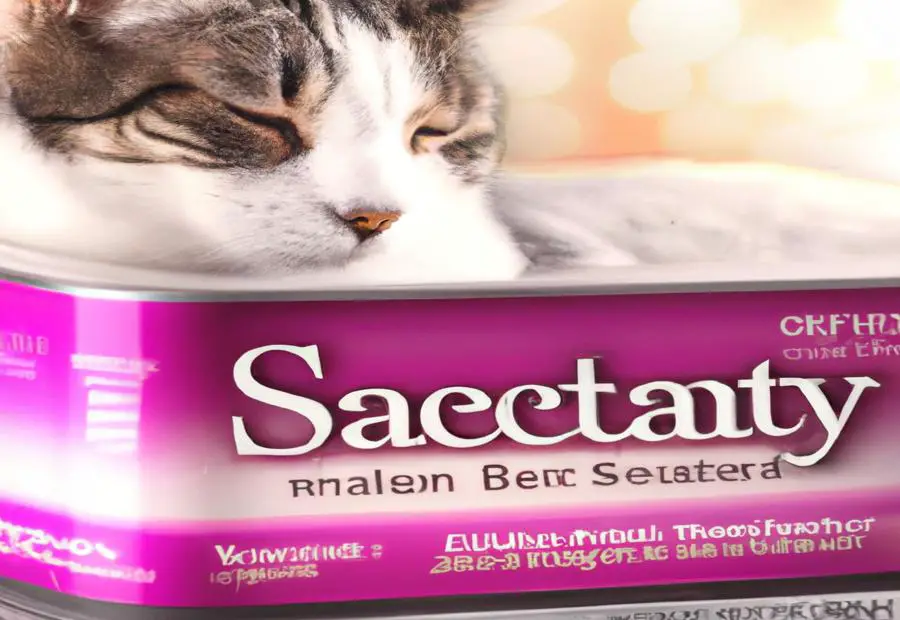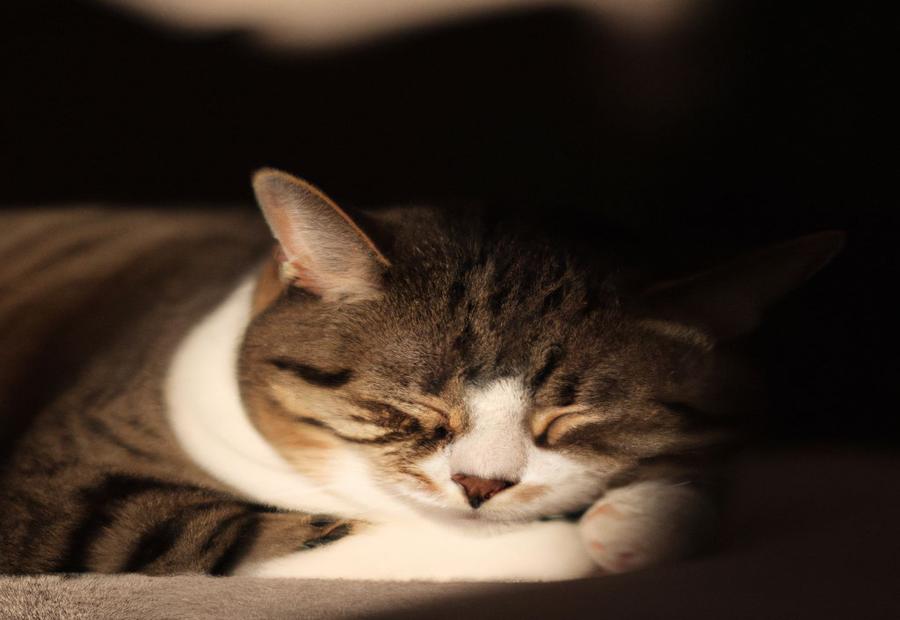Last Updated on 10 months by Francis
.jpg)
Vicks VapoPads are a common remedy used by many people to relieve congestion and nasal discomfort. However, when it comes to using these products around cats, there are concerns about safety.
It is important to understand what Vicks VapoPads are and the potential risks they may pose to our feline friends. By referencing reputable sources such as the American Society for the Prevention of Cruelty to Animals (ASPCA) and veterinarians’ expertise, we can gain insights into the safety of Vicks VapoPads for cats.
This article will explore the ingredients in Vicks VapoPads, potential dangers for cats, and provide information on symptoms of exposure and precautionary measures to ensure the well-being of our beloved pets. We will highlight alternative cat-friendly remedies for congestion and nasal discomfort.
Contents
Key takeaway:
- Vicks VapoPads should not be used around cats: Inhalation and skin contact with Vicks VapoPads can pose risks to cats due to the ingredients and potential dangers involved.
- Symptoms of Vicks VapoPads exposure in cats: If a cat is exposed to Vicks VapoPads, symptoms such as respiratory distress and skin irritation may occur.
- Safe alternatives for cat congestion: It is recommended to use cat-friendly remedies for congestion and nasal congestion, as Vicks VapoPads are not safe for cats.
What Are Vicks VapoPads?
Vicks VapoPads are scented pads that can be used with Vicks humidifiers and vaporizers to provide soothing vapors for congestion relief. They are made with a blend of essential oils, including eucalyptus, menthol, and camphor. These pads are designed to be inserted into a special compartment in the humidifier or vaporizer, where they release the aromatic vapors into the air. The vapors can help to alleviate nasal congestion and coughing, providing a comforting environment for better breathing.
I remember a time when I had a terrible cold and could hardly breathe. A friend recommended using Vicks VapoPads with my humidifier. Skeptical at first, I decided to give it a try. I inserted a VapoPad into my humidifier and turned it on. Within minutes, I noticed a pleasant aroma in the air. As I continued to use it throughout the night, I felt my nasal passages opening up, and my congestion gradually easing. The Vicks VapoPads provided such a soothing and refreshing experience that helped me get a restful night of sleep. From then on, I always kept a stock of VapoPads at home, knowing they could provide the relief I needed during those uncomfortable cold and flu seasons.
Can Cats Be Exposed to Vicks VapoPads?
Curious about whether Vicks VapoPads are safe for your feline friends?
Let’s dive into the question of whether cats can be exposed to Vicks VapoPads.
We’ll explore the ingredients lurking in these pads and uncover any potential dangers they may pose for our beloved cats.
Stay tuned to learn more about the hidden risks and keep your furry companions safe. Are vIcks vapopads safe for cats
Ingredients in Vicks VapoPads
The ingredients in Vicks VapoPads are important to consider, especially if you have a cat in your home. Below is a table showcasing the ingredients found in Vicks VapoPads:
| Ingredient | Function |
| Camphor | Provides a soothing aroma and helps relieve congestion |
| Eucalyptus oil | Offers a refreshing scent and helps open up the nasal passages |
| Menthol | Produces a cooling sensation and helps alleviate nasal discomfort |
It’s important to note that these ingredients are safe for humans when used as directed. However, when it comes to cats, caution must be taken. Cats are more sensitive to certain substances, and their exposure to Vicks VapoPads can potentially be harmful.
Pro-tip: If you have a cat at home, it is best to avoid using Vicks VapoPads or any other products containing ingredients that may be harmful to them. Always consult with a veterinarian for safe and cat-friendly remedies for congestion and nasal discomfort.
Remember, the well-being of your furry friend should always be a top priority.
Potential Dangers for Cats
When it comes to Vicks VapoPads, there are potential dangers for cats that should be recognized and precautions that should be taken to ensure their well-being.
Vicks VapoPads contain essential oils like eucalyptus, menthol, and camphor, which can be toxic to cats if ingested or applied topically. Cats have sensitive respiratory systems, so the strong vapors emitted by Vicks VapoPads may irritate their lungs and airways when inhaled. Direct contact with Vicks VapoPads or their residue can potentially cause skin irritation or allergic reactions in cats. Since cats groom themselves extensively, if they come into contact with Vicks VapoPads, there is a risk of ingestion of harmful substances. Additionally, some cats may have allergies to the ingredients in Vicks VapoPads, which could lead to symptoms such as itching, sneezing, or difficulty breathing.
Are Vicks VapoPads Safe for Cats?
Curious about the safety of Vicks VapoPads for your feline friend?
Let’s dive into the potential risks and concerns associated with Vicks VapoPads and their use around cats.
In this article, we’ll explore the inhalation risks that Vicks VapoPads may pose for our whiskered companions, as well as the potential risks of skin contact.
Stay tuned to learn more about how to keep your precious kitty safe and sound when using Vicks VapoPads in your home.
Inhalation Risks for Cats
Vicks VapoPads can pose inhalation risks for cats. The active ingredients, such as eucalyptus oil and camphor, found in these pads can be harmful if inhaled by our feline friends. Inhaling these substances may cause respiratory irritation, difficulty breathing, and even respiratory distress. It’s important to remember that cats have a delicate respiratory system, and exposure to strong smells or vapors can be particularly worrisome for them.
We must acknowledge that cats are more sensitive than humans to certain substances, and what may be harmless for us could be perilous for them. That’s why it is crucial to keep Vicks VapoPads and similar products out of the reach of cats to prevent any accidental inhalation.
If you observe any signs of respiratory distress or irritation in your cat, such as coughing, wheezing, or excessive salivation, it is imperative to seek immediate veterinary care. The veterinarian can provide the necessary treatment and help ease any discomfort caused by the inhalation of VapoPads.
To ensure the safety of your cat, it is advisable to refrain from using Vicks VapoPads or any similar products in areas where cats frequently spend their time. Consulting with a veterinarian for safe and cat-friendly remedies for congestion and nasal issues is always the best course of action to avoid any potential inhalation risks for our precious feline companions.
Skin Contact Risks for Cats
The skin contact risks for cats when exposed to Vicks VapoPads include:
- Cats are at risk of experiencing skin contact risks, such as irritation, when they come into contact with Vicks VapoPads.
- Some cats may have allergies to the ingredients in Vicks VapoPads, which can result in allergic reactions upon skin contact.
- When cats come into skin contact with Vicks VapoPads, they may develop dermatitis, causing redness, itchiness, and inflammation.
- Vicks VapoPads contain substances that may harm cats if they come into direct contact with their skin.
To mitigate the skin contact risks for cats:
- Avoid placing Vicks VapoPads where cats can come into contact with them to prevent any potential harm.
- Keep Vicks VapoPads securely stored away from your cat’s reach to ensure their safety.
- If your cat accidentally comes into contact with Vicks VapoPads, it is important to immediately rinse the affected area with mild soap and water.
- Observe your cat for any signs of skin irritation or allergic reactions, and seek veterinary advice if necessary.
Note: It is important to prioritize the safety and well-being of your pets and consult with a veterinarian before using any products that may pose risks to them.
What Are the Symptoms of Vicks VapoPads Exposure in Cats?
Vicks VapoPads are not safe for cats and can cause potential health issues. Exposure to VapoPads can lead to various symptoms in cats.
Symptoms of Vicks VapoPads exposure in cats may include respiratory distress, excessive drooling, coughing, sneezing, wheezing, difficulty breathing, and gastrointestinal upset. Cats may also experience skin irritation or allergic reactions if they come into direct contact with the pads.
If your cat shows any of these symptoms after being exposed to VapoPads, it is important to seek veterinary care immediately. Your veterinarian can provide appropriate treatment and support to alleviate the discomfort and prevent further complications.
It is crucial to keep VapoPads and any other potentially harmful substances out of reach of pets to ensure their safety. Always consult with your veterinarian before using any products in your home that could be harmful to your cat.
A cat owner once mistakenly left a VapoPad within reach of their curious feline. The cat, unaware of the potential danger, spent some time playing with the pad and rubbing against it. Later that evening, the cat started exhibiting respiratory distress, coughing, and sneezing. The concerned owner rushed the cat to the veterinarian, who determined that the symptoms were a result of VapoPad exposure. After receiving appropriate treatment, the cat eventually recovered fully. This incident serves as a reminder for pet owners to be cautious and keep harmful substances away from their pets.
Original TableWhat Should You Do If Your Cat is Exposed to Vicks VapoPads?
If your cat is exposed to Vicks VapoPads, what should you do? There are certain steps you should take to ensure their safety.
First, remove your cat from the area where the VapoPads are present. This will help limit their exposure to the chemicals in the product.
Next, provide fresh air by opening windows and using fans to circulate the air. This will help minimize the inhalation of the vapors.
It’s also important to observe your cat for any signs of irritation, such as coughing, sneezing, or difficulty breathing. If you notice any of these symptoms, contact your veterinarian immediately for further guidance.
It’s crucial to act promptly to prevent any potential harm to your furry friend.
Fact: Cats are more sensitive to certain chemicals and scents compared to humans. Their smaller size and unique physiology can make them more susceptible to adverse reactions from exposure to products like Vicks VapoPads.
Precautions to Take When Using Vicks VapoPads Around Cats

Photo Credits: Infraredforhealth.Com by Justin Thomas
When using Vicks VapoPads around cats, it is important to take precautions to ensure their safety and well-being.
- Keep VapoPads out of reach: Cats are curious animals and may be tempted to play with or ingest the VapoPads, which can be harmful. Therefore, store the pads in a secure location away from your cat’s reach.
- Avoid direct contact: Cats have sensitive skin, so it is best to prevent direct contact between the VapoPads and your cat. This can be done by placing the pads in a well-ventilated area or using a diffuser specifically designed for use around pets.
- Monitor for any adverse reactions: While VapoPads are generally considered safe for use around cats, each cat may react differently. Keep an eye out for any signs of discomfort, such as excessive sneezing, coughing, or lethargy. If these symptoms occur, remove the VapoPads from the area and consult your veterinarian.
- Follow the instructions: Always read and follow the instructions provided with the VapoPads. Using the pads as directed will help minimize any potential risks to your cat.
- Consider alternative options: If you have concerns about using VapoPads around your cat, consult with your veterinarian for alternative solutions that are safe and suitable for your pet’s needs.
Alternative Cat-friendly Remedies for Congestion and Nasal Congestion

Photo Credits: Infraredforhealth.Com by Philip Campbell
Here is a list of alternative cat-friendly remedies for congestion and nasal congestion:
- Humidifier: Running a humidifier can help moisturize the air and relieve nasal congestion for cats.
- Steam therapy: Create a steamy environment by running a hot shower or using a portable steam inhaler. Allow your cat to breathe in the moist air for a few minutes.
- Eucalyptus oil: Dilute a small amount of eucalyptus oil in water and gently apply it to your cat’s bedding or favorite areas. The soothing aroma may help open up their nasal passages.
- Nasal saline drops: Using a cat-specific nasal saline solution, apply a few drops into each nostril to help moisturize and clear congestion.
- Elevation: Provide your cat with an elevated resting area, such as a bed or cushion, to help relieve nasal congestion by promoting better drainage.
Pro-tip: If your cat is experiencing persistent or severe congestion, it is important to consult with a veterinarian. They can provide appropriate guidance and recommend safe and effective remedies for your cat’s specific needs.
Some Facts About Are Vicks Vapopads Safe for Cats:
- ✅ Vicks Vapopads should never be given to cats as they contain ingredients that can be toxic to them. (Source: Fluffy Planet)
- ✅ Camphor, menthol, nutmeg, and eucalyptus oil present in Vicks Vapopads can harm cats. (Source: Fluffy Planet)
- ✅ Ingesting Vicks VapoSteam can lead to diarrhea, nausea, vomiting, skin problems, seizures, or depression in cats. (Source: Fluffy Planet)
- ✅ Cats exposed to Vicks Vapopads can suffer from aspiration pneumonia and other toxicity issues. (Source: Pet Advisers)
- ✅ It is important to avoid using Vicks Vapopads in humidifiers for cats, as it can cause permanent harm to their bodies. (Source: Pet Advisers)
Frequently Asked Questions
Are Vicks Vapopads safe for cats?
No, Vicks Vapopads should never be given to cats as they contain ingredients that can be toxic to them. These ingredients include camphor, menthol, nutmeg, and eucalyptus oil, which can cause various health issues such as liver damage, respiratory issues, seizures, and skin problems in cats.
Can I use Vicks Vapopads in a room where my cat is not present?
Even if your cat is not in the same room as the Vicks Vapopads, it is still not safe for them. The toxic ingredients can spread through the air and may harm your cat if they come in contact with it.
What are the symptoms of Vicks VapoSteam poisoning in cats?
Symptoms of Vicks VapoSteam poisoning in cats include diarrhea, nausea, vomiting, excessive itching, teary eyes, reddened skin, abdominal pain, itchy throat, dry mouth, heart palpitations, increased blood pressure, and other respiratory issues. In severe cases, it can even lead to seizures or depression.
What should I do if my cat has been exposed to Vicks Vapopads?
If your cat has been exposed to Vicks Vapopads, it is important to seek veterinary attention immediately. Bring the cream or ointment with you for diagnosis and treatment. It is recommended to wash your hands thoroughly after handling Vicks products to prevent accidental exposure to your cat.
Can I use other scented additives or essential oils in a humidifier for my cat?
No, it is best to avoid using any scented additives or essential oils in a humidifier for your cat. These substances can also be toxic to cats and may cause harm to their health. Stick to using a scentless humidifier and ensure your cat’s safety.
What are some safe alternatives to Vicks Vapopads for cats?
If you want to provide relief to your cat’s respiratory issues or increase humidity in the house, consider using pet-safe humidifiers or cold mist humidifiers instead. Also, consult with your veterinarian for appropriate remedies or medications specific to your cat’s needs.








